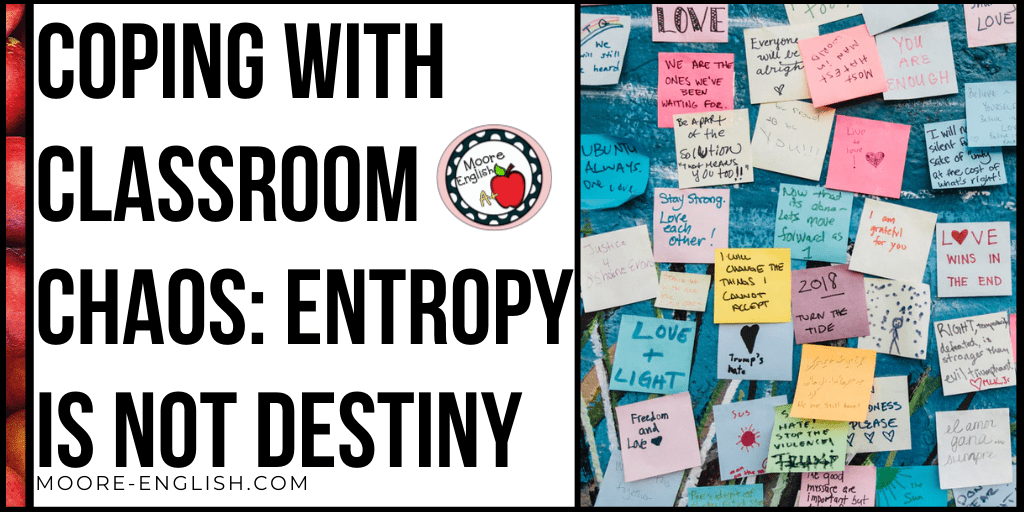If I remember science class correctly, the second law of thermodynamics states that systems tend toward entropy or disorder. This also seems to be true of schools: we tend toward entropy. As the semester comes to a close, sometimes teachers begin to feel like they are making a last stand between their classroom and entropy. I know that is how I feel sometimes.
My school is in a state of increasing entropy right now: we are under massive construction, we are preparing for a substantive change in how we schedule courses, and we may have altered start times next year. To say “change is in the air” would be a massive simplification.
However, that certainly does not mean that my fellow teachers and I are throwing our hands up and handing ourselves and our students over to chaos.
The second law of thermodynamics also says that some systems exist in an ideal state of equilibrium or are undergoing reversible processes. For the sake of our metaphor, that means schools and teachers do not have to accept chaos. In the classroom, entropy is not destiny.

This post this post may contain affiliate links. Please read the Terms of Use.
Internal Change Agents
In fact, every day teachers make choices aimed to reduce entropy. We develop and practice classroom routines, we establish predictable and reasonable expectations, and we set goals with our students. Teachers develop relationships with students, model ideal behavior, and develop engaging and meaningful lessons. Each one of these actions stymies entropy.
When I see entropy arise in my classroom, I ask myself a few questions:
- How did I prepare for this? What have I done to proactively meet this challenge?
- In the moment (as chaos crests the horizon), how did I respond? Were my reactions effective?
- What do I wish I could do differently?
My goal is that (eventually) I can stop at No. 1 because some procedure, management tool, goal, or relationship has stymied chaos. However, unpredictability and impulsivity are trademarks of entropy (and sometimes of teenagers), so I won’t always be able to stop at No. 1. Nevertheless, these are my markers for reflection.
External Change Agents
However, classroom management focuses on the activity within one system: your classroom. While the classroom is its own system, it is also part of the larger school system, and chaos can come from without as easily as it can come from within.
While internal classroom interruptions can be irritating, at least they have a degree of predictability.
On the other hand, external interruptions or changes are the real agents of entropy because they are not always predictable: assemblies, safety drills, and interim testing happen, sometimes without warning.
When external interruptions cause entropy, I ask myself these questions:
- How did I prepare my students for this? What have I done to proactively prepare them for this situation?
- Did my reaction to an external force of entropy model for students the reaction I’d hope to see in them? In other words, am I proud of my reaction?
- Do I wish something had gone differently? Is that “something” in my power–if so, see No. 1 and 2 above. If not, how do I effectively and professionally communicate that something could have gone better? What avenues already exist for expressing this desire?
At least for me, No. 3 is a battle. It’s much easier for me to grouse at lunch about how something was mishandled. However, when I do find and use an open avenue for expressing my concerns or desires, the result is almost always (at minimum) respect. Do I always get what I want in terms of stopping external interruptions? No, but expressing my concerns professionally at least puts them on someone else’s radar and makes it more likely that, in the future, my concerns will be addressed.
Toward Equilibrium
At its heart, the second law of thermodynamics (as applied by an ELA teacher) suggests that only ideal systems are perfect.
And you and I know that “ideal” school systems do not exist. Like many physics problems, they are theoretical or hypothetical.
For this reason, avoid focusing on achieving perfection and, instead, focus on anticipating entropy. The enemy of entropy is not peace or serenity but equilibrium. The reflective questions above will not eliminate entropy, but they will provide us with the tools to promote equilibrium.

Photo by Kyle Glenn on Unsplash













